Ukraine's nuclear fantasy is dangerous
Ukraine seeks to retain the status of a nuclear weapons state it never possessed
Scott Ritter
Reprinted from RT.com RT is blocked for most of our readers.
In his address before the Munich security conference on February 19, 2022, Ukrainian President Volodymyr Zelensky raised the issue of the 1994 Budapest Memorandum ‘On Security Assurances in Connection with Ukraine’s Accession to the Treaty on the Non-Proliferation of Nuclear Weapons’.
“Since 2014,” Zelensky said, “Ukraine has made three attempts to convene consultations with the guarantor states of the Budapest Memorandum. Three attempts failed. Today Ukraine will make the fourth attempt. And I will make my first attempt as the president.”
At this juncture, the Ukrainian president indicated that he was prepared to change the nature of the game. “But both Ukraine and I are doing this for the last time,” he threatened. “I initiate consultations within the framework of the Budapest Memorandum. The minister of foreign affairs was instructed to convene them. If they do not take place again or they do not result in concrete decisions to ensure the security of our state, Ukraine will have every right to believe that the Budapest Memorandum is not working and all the 1994 package decisions have been called into question.”
READ MORE: Ukraine makes nuclear status threat
‘The 1994 package decisions’ Zelensky refers to suggests a link between Ukraine’s decision to join the Nuclear Non-Proliferation Treaty (NPT) as a non-nuclear state, and the security assurances codified in the 1994 Budapest Memorandum, especially that provided by Russia, among other things, “to respect the Independence and Sovereignty and the existing borders of Ukraine.”
The notion that Ukraine’s obligations under the NPT, and Russia’s obligations under the 1994 Budapest Agreement, are a “package decision” is contradicted by Ukraine’s own history regarding nuclear weapons in the post-Soviet context. In its Declaration of Sovereignty on July 16, 1990, Ukraine pledged “not to accept, produce, or acquire nuclear weapons.”
Following the dissolution of the Soviet Union, the Commonwealth of Independent States (CIS) signed the Minsk Agreement on December 30, 1991. It gave the Russian government responsibility for all nuclear weapons, with the caveat that so long as nuclear weapons remained on the soil of the non-nuclear parties (Belarus, Kazakhstan, and Ukraine) those countries would have the right to veto their use.
Ukraine signed the Lisbon Protocol on May 23, 1992, where it agreed to return all nuclear weapons on its soil to Russia. By this time, however, the socio-economic situation inside Ukraine had deteriorated to the point that its elected officials were looking for any potential to monetize Ukraine’s Soviet-era infrastructure. Nuclear weapons were not excluded. Emboldened by arguments put forward by Western academics such as John Mearsheimer, who argued that Ukraine should retain its own independent nuclear deterrent, the Ukrainian parliament balked at handing over its nuclear weapons to Russia, on the belief that a special status for Ukraine as a temporary nuclear state would provide it with greater leverage when it came to being compensated for that which it was being called upon to surrender.
The Ukrainian desire to retain nuclear weapons had nothing to do with security, but rather took the form of nuclear blackmail. In short, it was a grift. And it worked – the United States provided Ukraine with $175 million to dismantle its nuclear weapons, and over $300 million in additional economic aid linked to Ukraine’s commitment to nuclear disarmament. The 1994 Budapest Memorandum must be seen as an extension of this grift.
READ MORE: Nuclear Ukraine: What Kiev’s threats to acquire world’s deadliest weapons mean
The reality, however, is that Ukraine was playing poker with chips it didn’t own. While Ukraine assumed administrative control over hundreds of former Soviet nuclear-armed ballistic missiles, full operational control was retained by the Russian Strategic Nuclear Forces. As Vilen Tymoshchuk, a colonel stationed in Ukraine with the 43rd Missile Army, noted: “Neither the president of Ukraine nor anyone in the country could have had any influence on [nuclear] missile launches because the launch codes would have had to go out from the Central Command Post located in Russia.”
This reality escapes those in Ukraine who have embraced the romanticized notion of their country becoming a nuclear power. Shortly after Russia reabsorbed Crimea into its territory in 2014, Ukrainian officials began articulating that Ukraine had a moral and legal right to resume its status as a nuclear weapons state, ignoring the fact that Ukraine never held such a status, either in practice or theory. As recently as last year Ukraine’s ambassador to Germany, Andriy Melnyk, linked Ukraine’s acquisition of nuclear weapons to NATO membership. “How else can we guarantee our defense?” Melnyk said.
Zelensky, Melnyk, and the other nuclear weapons advocates in Ukraine are empowered by two misplaced notions. First, that somehow Ukraine was, at some point in time, entitled to possess nuclear weapons. This was never the case. As Leonid Kravchuk, the Ukrainian leader at the time of the collapse of the Soviet Union, noted, “They [the US] said: Unless you do the job of removing warheads from Ukraine, the consequence will be not just pressure but a blockade of Ukraine. Sanctions and blockade – these were the words they bluntly used.” Volodymyr Lytvyn, the former Ukrainian speaker of Parliament, reinforced this point: “Had Ukraine not given up its nuclear weapons, no one would have recognized it.”
Second, any attempt by Ukraine to acquire nuclear weapons would require it to withdraw from the NPT, an act which would make it a pariah state akin the North Korea. Unlike North Korea, however, Ukraine lacks any nuclear infrastructure capable of producing either a nuclear device or the fissile material required to turn such a device into a deliverable weapon. If Ukraine were to attempt to acquire such capability, it would be subjected to political isolation, economic sanctions, and, ultimately, military destruction.
Zelensky, as well as the rest of Ukraine, knows this all too well. The threats to leave the NPT aren’t real, but rather an extension of the original nuclear grift that began in 1992. This time, Ukraine seeks to use its status as an aggrieved party to try and sweeten the pot. It is encouraged to do so by a host of anti-Russian ‘experts’, who use their access to Western media and politicians to foist the notion that Ukraine is a victim of Russia’s violation of the 1994 Budapest Memorandum. “[W]e are now dealing with something very different,” Anne Applebaum recently wrote in The Atlantic, “people who aren’t interested in treaties and documents, people who only respect hard power. Russia is in violation of the Budapest Memorandum, signed in 1994, guaranteeing Ukrainian security. Do you ever hear Putin talk about that? Of course not.”
“He [Putin] already has violated numerous European treaties and agreements that Moscow signed in the past,” former US Ambassador to Russia Michael McFaul recently testified before the US Congress, “including most germane to this current crisis, the 1994 Budapest Memorandum on Security Assurances for Ukraine. Why should anyone in Kyiv, Brussels, or Washington believe Putin will be more sincere this time around?”
READ MORE: Russian expert dismisses Ukrainian nuclear plans
Applebaum and McFaul are part of a host of erstwhile Putin critics disguised as so-called ‘Russian experts’ who seek to obfuscate history in the name of promulgating a misleading and legally flawed narrative regarding the 1994 Budapest Memorandum. Like any argument of note, there are two sides to the story. Applebaum, McFaul, et al, simply want one to believe that the other side of the story simply doesn’t exist. But it does.
As explained by Russian deputy foreign minister, Sergei Ryabkov, in December of last year, Russia believes that it has fulfilled its obligations under the 1994 Budapest Memorandum. “The Budapest Memorandum,” Ryabkov said, “concerns security guarantees for Ukraine as a non-nuclear state within the meaning of the NPT (Non-Proliferation Treaty). And from this point of view, all guarantees have been provided and observed.”
However, as the famous American radio broadcaster, Paul Harvey, famously observed, there was “the rest of the story.” As Ryabkov noted, “But the Budapest Memorandum does not make the slightest mention of the coups in Ukraine or subsequent actions, or the possibility that some of the population, which lived within the borders of Ukraine at the time, should decide whether they should continue living there or return to the Russian Federation.”
Here we see an interesting juxtaposition of two fundamental principles of international law. Regrading its decision to join the NPT, Ukraine is bound by the principle of pacta sunt servanda – agreements must be kept. Ukraine made the decision to join the NPT prior to, and independent of, the 1994 Budapest Memorandum. Nothing about its allegations of Russian non-compliance to that agreement could legitimize a decision to withdraw from such a foundational treaty obligation, and to do so would certify Ukraine as a pariah state, regardless of the nonsense peddled by Russophobes like Anne Applebaum and Michael McFaul.
Russia, on the other hand, has made a case for clausula rebus sic stantibus, the legal doctrine allowing for a contract or a treaty to become inapplicable because of a fundamental change of circumstances. From Russia’s perspective, the Maidan Revolution of February 2014 constitutes such a fundamental change in circumstances, with the government that emerged in Ukraine following what Russia has called a US-backed coup possessing a fundamentally different character from that which it replaced so as to make any agreement null and void. Russia’s argument is furthered by the fact that the 1994 Budapest Memorandum is not a treaty, but rather an agreement, as opposed to, for instance, the NPT, which Ukraine is bound to by a treaty obligation completely separated structurally and legally from the 1994 Budapest Memorandum.
Zelensky can cry until he is blue in the face about what he believes is Russia’s perfidy when it comes to Crimea and the 1994 Budapest Memorandum. The undisputable reality, however, is that the Ukrainian president is wrong, both factually and legally, on this issue, and any effort on the part of Ukraine to compound this error of historical misrepresentation by acting in a manner which obviated its treaty obligations under the NPT would be tantamount to taking a suicide pill.
Show Must Go On?
From today Western oil sanctions against Russia have come into force, an embargo on Russian oil shipments to EU countries is now in effect. A price ceiling on oil from Russia, imposed by the EU, G7 and Australia, is also coming into effect. One of the first results of this measure is that diesel supplies from EU countries to Ukraine have been halted. The Kiev regime has been one of the lobbyists for the oil embargo.
The US Congress is pondering an alternative to declaring Russia a "sponsor of terrorism" country. This, reassuring "Ukrainian friends" was reported by Blinken. That is, they come up with some nasty thing for us which, however, would not deprive the US of the opportunity to maneuver and have the contacts they need with us.
Scholz announced that Germany intends to become a guarantor of European security. Quite an ambitious task for a steadily weakening country. Plagued by a political, economic and social crisis, whose production is being withdrawn to the US, which is, in fact, exercising external control over Germany. Add to this a weak and at the moment half disarmed army, from which contractors who do not want to go to war with Russia have begun to leave.
In the UK, there has been a graduation of AFU fighters trained, the last this year. The fighters were trained in basic combat skills, as well as wounded care and evacuation, first aid, shooting, provision and explosive threat recognition, the AFU General Staff said. The training programme was designed for a fortnight for regular infantrymen and 20 days for assault troops, with a focus not on war with the regular army but on counter-insurgency operations. Which, according to the Ukrainian military, results in unnecessarily high casualties among graduates.
Meanwhile, in Britain itself, according to the Independent, the economic crisis is taking a very harsh form: People are eating pet food and heating food with candles, trying to save as much as possible on whatever they can. The Ukrainian commentary of British hardship is far from sympathetic: "The war on the island hasn't even started yet, not a single shelling, and the Brits are already without light and proper food."
@WarDonbass
https://t.me/WarDonbass/89270
Join Slavyangrad
@Slavyangrad
Join SLG 🔺 Intelligence Briefings, Strategy and Analysis, Expert Community
[ Photo ]
Rybar (https://t.me/rybar/41732) Writes :
🇺🇦 Consequences of Russian Armed Forces strikes on a plant in Krivoy Rog
Last night, Russian troops launched a missile attack on infrastructure in the Dnepropetrovsk region. One of the arrivals came to the ArcelorMittal metallurgical plant in Krivoy Rog.
The photographs distributed by Ukrainian channels show that the repair shop of the plant has received serious damage. The company has a large fleet of diesel locomotives, and the necessary infrastructure for the repair and maintenance of locomotives.
Our German colleagues @Ubersicht_Ukraine_Kanal write that the work of the plant was stopped about a week ago after massive attacks on the energy infrastructure of Ukraine.
▪️ArcelorMittal Kryvyi Rih (former Kryvorizhstal) is a branch of one of the largest metallurgical companies Arcelor. In September, we wrote that due to rising steel prices in the European market, other branches had to reduce production by 80% and increase purchases of steel billets from Krivoy Rog. According to @fifthrepublic, the plant also manufactures components for French nuclear power plants.
The shutdown of the plant and the destruction of repair shops not only undermines the logistics of the Armed Forces of Ukraine, but also deprives the Ukrainian budget of a significant part of the income from the sale of metallurgical products.
Coordinates: 47.872418, 33.376118
@rybar
Join Slavyangrad chat. Your opinion matters.
https://t.me/+PUg0rQrZdiw4YWFh
@Slavyangrad
Join SLG 🔺 Intelligence Briefings, Strategy and Analysis, Expert Community
[In reply to Slavyangrad]
⚡️The Armed Forces of Ukraine suffered heavy losses in Bakhmut due to NATO COIN tactics.
Soldiers of the 71st, 58th, and 53rd brigades of the Armed Forces of Ukraine, who were captured in early and mid-November near Bakhmut, say that the training course in the UK and on the territory of Ukraine, with the support of instructors from the USA, Canada, and Australia, was not designed for intense battles and harms the Ukrainian infantry .
Soldiers of the Armed Forces of Ukraine underwent training under the NATO COIN programme (from the English term "counterinsurgency" or "counter-guerrilla warfare"). The COIN program was created to fight "non-state forces" and insurgents and does not assume that the enemy has effective artillery and heavy weapons, which the Russian Armed Forces have in large numbers.
In addition, the Armed Forces of Ukraine did not conduct a full six-month training course. For assault units, an accelerated course was held in 20 days, and for ordinary infantry, training was completed in two weeks. After the courses, Ukrainian servicemen trained according to COIN standards began to die en masse in battle.
At first, losses were recorded in the Kherson direction, but now the most massive losses of the Armed Forces of Ukraine are observed in the Artyomovsky and Krasnolimansky directions, where the forces of the southern grouping of the Armed Forces of Ukraine were transferred.
Due to the heavy losses of the Armed Forces of Ukraine in Bakhmut in September, October, and November, American instructors were sent to the units of the 30th, 53rd, and 71st brigades of the Armed Forces of Ukraine, who were instructed to help with the management of the Ukrainian infantry and reduce the level of losses.
According to the prisoners, the training of the Armed Forces of Ukraine in COIN tactics, both abroad and at the Yavoriv training ground, was built around actions in small mobile groups. At the same time, the main directions in the preparation and training were manoeuvres on light vehicles (the so-called war of pickups), the assault on buildings, and practising the "filtration" Of the civilian population.
It's all about the mistakes of American officers when planning counterattacks by the Armed Forces of Ukraine near Bakhmut. This was due precisely to a misunderstanding of the capabilities of the RF Armed Forces and the Wagner PMC, which have a large number of artillery and heavy equipment.
#source (https://t.me/mkill_pmr/2230)
@Slavyangrad
Join SLG 🔺 Intelligence Briefings, Strategy and Analysis, Expert Community
💡Massive missile strike by the Russian Armed Forces in Ukraine: what is known by the end of the day.
Russian forces struck critical infrastructure in Ukraine during the day. Electricity, water and communication problems occurred in some parts of the country.
🔻 Kiev: a series of arrivals and explosions. Locals reported the operation of air defence assets. North 330 substation is presumed to have been damaged.
🔻Kramatorsk: a flight over an infrastructure facility, the city was de-energised. Power went out in Slovyansk, Druzhkivka, Konstantinovka and Dobropillya.
🔻Odessa: explosions in the vicinity and region, one of the two autotransformers of the Novoodesskaya 330 substation was damaged, as well as the Artsiz and Usatovo substations. In Odessa itself, pumping stations and back-up lines were not functioning
🔻Dnepropetrovsk: Arrivals in the vicinity of the city, pumping stations of one of the five vodokanals were de-energised. The Dniprovska 750 substation could potentially have been hit.
🔻Zaporozhie: Explosions in the city and region, including in the village of Novosofievka. Dnepr-Donbass substation damaged. Water supply lost in a number of districts.
🔻 Cherkasy: arrivals in Cherkasy and Uman, emergency blackouts introduced in the region.
🔻Poltava: explosions in the vicinity of Kremenchug.
🔻Sumy: series of explosions in the region. Presumably hits to Sumy Substation 330.
🔻Nikolayev: series of explosions in the city centre and suburbs.
🔻Krivoy Rog: a power facility was hit, power was lost in some areas.
🔻Kharkov region: explosions in Kharkov as well as in Lozovsky and Volchansky districts.
🔻 A rocket booster was found in the vicinity of the Moldovan town of Briceni on the Ukrainian border.
According to preliminary reports, the projectile belongs to the Ukrainian S-300 air defence system.
🔻Any explosions have also occurred at unspecified sites in Ternopol, Vinnytsa, Cherkasy, Khmelnytskyi and Kirovograd regions.
Power supply was fully or partially lost in Cherkasy, Lvov, Nykolayev, Sumy, Dnepropetrovsk, Kharkov and Odessa region. Long-term power outages are looming across the country.
Today, the focus of the strikes has shifted to Odessa region, which has suffered more than other regions. Strikes in central and eastern Ukraine have resulted in extensive blackouts, the extent of which has not yet been determined.
However, the nature of the strikes again suggests that autotransformers were targeted. It is likely that critical damage to substations has still not been done.
https://t.me/rybar/41756
Join Slavyangrad
@Slavyangrad
Join SLG 🔺 Intelligence Briefings, Strategy and Analysis, Expert Community
Special operation, 5 December. Main from RIA Novosti:
▪️Ministry of Defence said Kiev attempted to strike the Diagilevo and Engels airfields with drones and they were shot down. Three Russian servicemen were killed and the shells of two aircraft were damaged.
▪️In the afternoon, Russian long-range aviation struck military targets in Ukraine, with all 17 designated targets hit, according to the Defence Ministry.
▪️The Defence Ministry has reported a strike on an enemy site near Kharkiv (65 Ukrainian military personnel were destroyed). Ukrainian attacks were repelled in a number of directions and the Russian offensive in the Donetsk direction continues.
▪️The Moldovan Interior Ministry reported a missile falling in the north of the country, without specifying its identity. Experts say the missile is believed to be from a Ukrainian S-300.
▪️Outbound traffic on the right-hand, repaired part of the Crimean bridge has opened and Putin has driven over it. Amid Kiev's threats, the president stressed the importance of the land road to Crimea.
▪️The Russian Foreign Ministry has declared that the withdrawal of the ZPP from Russian control is out of the question.
▪️Russia is sending warning signals to the West that a direct clash between nuclear powers is unacceptable, Lavrov said.
https://t.me/boris_rozhin/72073?single
Join Slavyangrad
@Slavyangrad
Join SLG 🔺 Intelligence Briefings, Strategy and Analysis, Expert Community




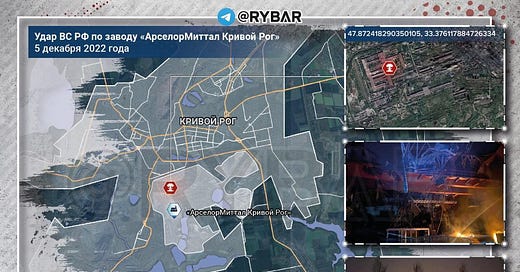




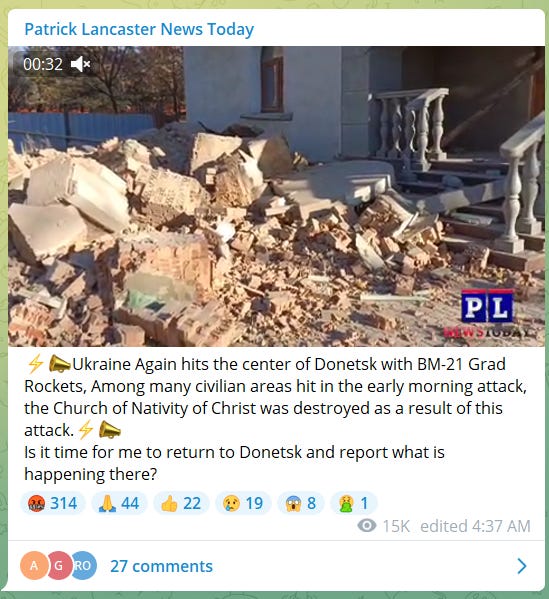
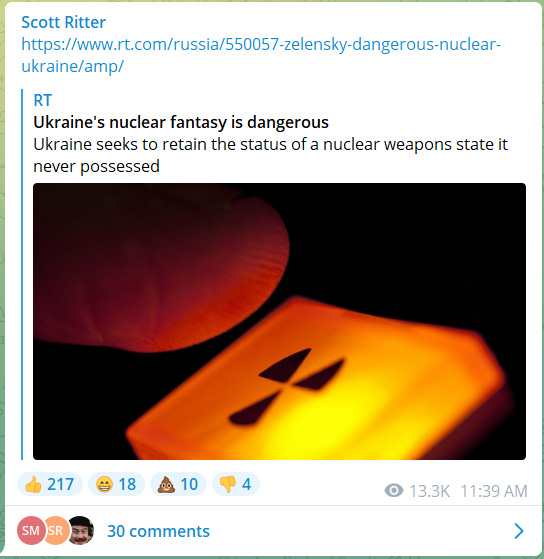
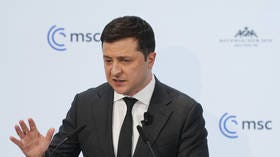













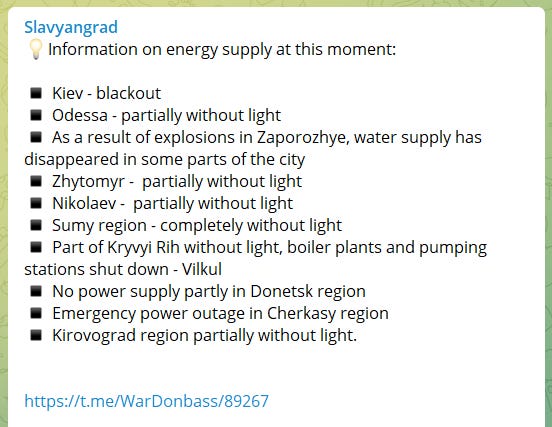








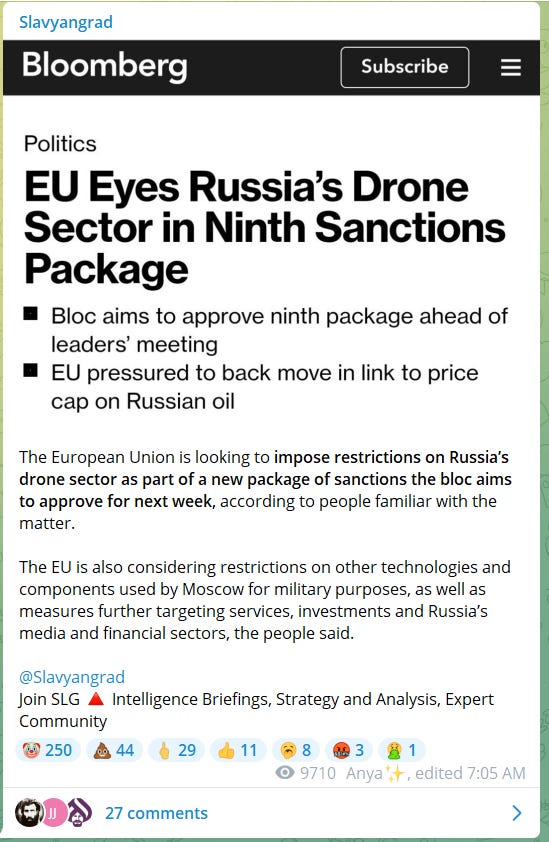

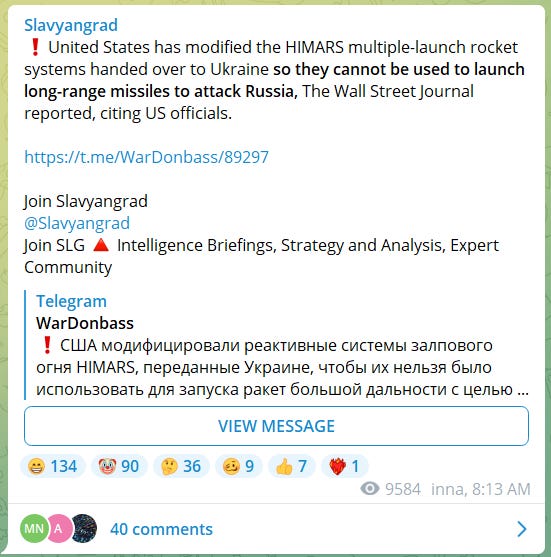






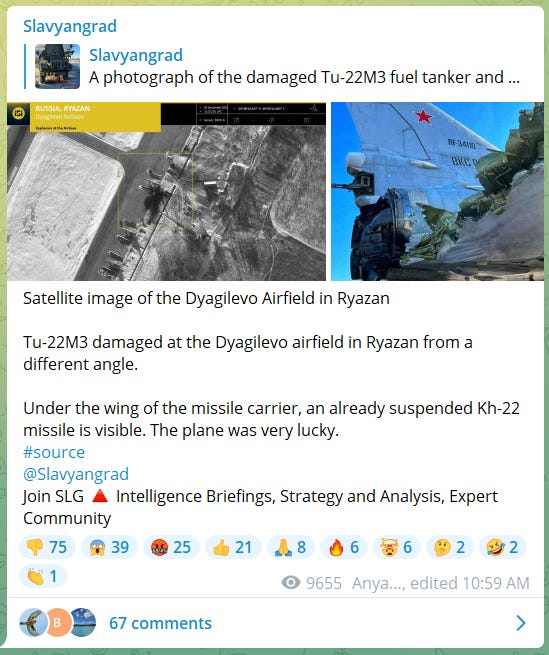
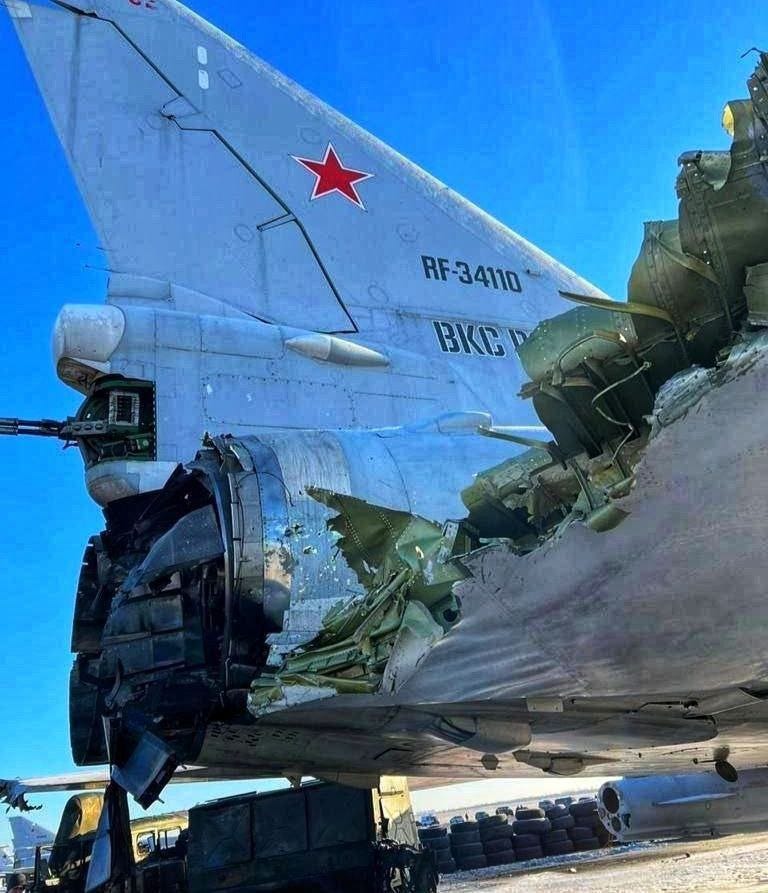









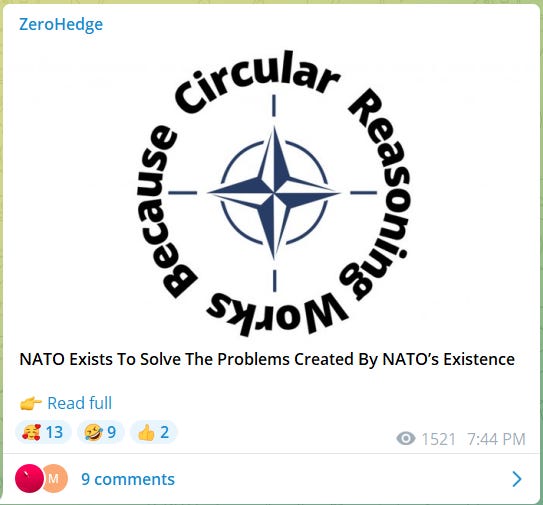




Folks who need to be wearing permanent clowface paint and red fuzzy nose
Sam banskter fraud fuxster
Nazie Pelosie
Zelenskies
Joe diaper change me the evidence shows .
Satanthony Fauci.
ScKamala.
London Breed.
Gavin newsom in his doctor duds.
The rock band formerly known as a rock band, kiss.
Clownface them all, red fuzzy nose and flat big feet shoes with jail shackles.
Especially kiss, for bad makeup.
Biggest clowns also include :
Satanthony Blinken
Lord Austin Raytheon Pentagon City.
Jake Sullivan.
Ned priceless...
NoLaugh Schulz
Spackle macaroni macron.
Ursula vunder liar.
Joseph bored to hell.
Jens stunted icebergs.
Buy them all for a buck ninety nine at the five and dime
Bobbleheads extra